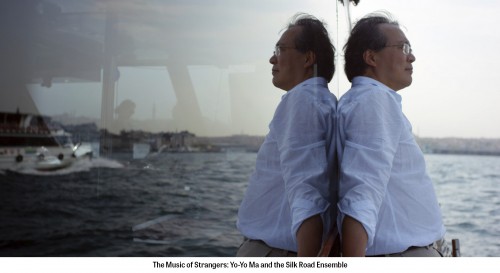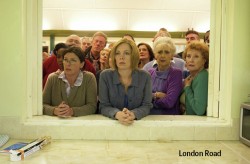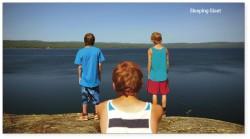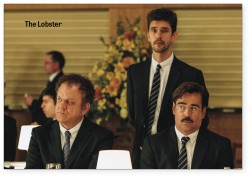 Welcome to The WholeNote’s fourth annual guide to the 2015 Toronto International Film Festival (TIFF), shining a light on films in which music plays an intriguing role. This year’s selection includes a film version of one of the most compelling musicals of the new century, several titles documenting musicians and their work – from two biopics and movies whose characters revolve around music – to those featuring soundtracks integral to their films’ artistic success. With 289 feature films from 71 countries, the following 27 choices are not the product of an exact science, only a loose guide for music-loving readers with a cinematic appetite.
Welcome to The WholeNote’s fourth annual guide to the 2015 Toronto International Film Festival (TIFF), shining a light on films in which music plays an intriguing role. This year’s selection includes a film version of one of the most compelling musicals of the new century, several titles documenting musicians and their work – from two biopics and movies whose characters revolve around music – to those featuring soundtracks integral to their films’ artistic success. With 289 feature films from 71 countries, the following 27 choices are not the product of an exact science, only a loose guide for music-loving readers with a cinematic appetite.  Rufus Norris’ London Road is a film adaptation of The National Theatre’s groundbreaking musical by Alecky Blythe and Adam Cork about the “Suffolk Strangler” murders in Ipswich in 2006.
Rufus Norris’ London Road is a film adaptation of The National Theatre’s groundbreaking musical by Alecky Blythe and Adam Cork about the “Suffolk Strangler” murders in Ipswich in 2006.
London Road uses the townspeople’s own descriptions of the events they lived through as the basis for the show’s lyrics, creating a fresh and arresting re-imagining of the form. The emotionally empathetic Tom Hardy is one of the townspeople. CanStage brought London Road to Toronto last winter in one of the highlights of the past season. It was a mesmerizing evening, a musical hybrid, as satisfying as it was innovative. After TIFF announced its selection, Rebecca Caine tweeted that she had seen both the stage and film versions, and that the film version was better.
Director Andrew Cividino describes his well-crafted Sleeping Giant as a cross between Lord of the Flies and Stand By Me. The Ryerson grad wanted to capture the energy of being a boy growing up near Lake Superior. He succeeds in doing so in this slick character study of a cottage boy and two locals hanging out over one summer of awkward adolescence. Their bullying and braggadocio are as wild as the setting itself. Toy Piano Composers co-founder Chris Thornborrow wrote the evocative score which is further underpinned by a handful of songs by indie rock band Bruce Peninsula.
Twenty Feet from Stardom director Morgan Neville follows up his Oscar winner with The Music of Strangers: Yo-Yo Ma and the Silk Road Ensemble, a documentary about the international musical collective created by legendary cellist Yo-Yo Ma. The film tracks this group of diverse instrumentalists, vocalists, composers, arrangers, visual artists and storytellers as they explore the power of music to preserve tradition, shape cultural evolution and inspire hope. The world premiere of the movie at TIFF September 13 (2:45pm at the Elgin) is just days ahead of the Silk Road with Yo-Yo Ma’s concert appearance at Massey Hall September 15. There are additional screenings September 15 (8:45am at TIFF Bell Lightbox 3) and September 18 (5pm at Isabel Bader).
 In Al Purdy Was Here dozens of literary talking heads led by Margaret Atwood bring the charismatic Canadian poet to life with anecdotes, reminiscences and first-hand history but it’s the copious video evidence of Purdy himself that makes the best case for his unique voice. The fate of Purdy’s Roblin Lake A-frame house in Prince Edward County is the starting point for this thorough documentary directed by former Maclean’s magazine film critic Brian D. Johnson and written by Johnson and his writer/editor wife Marni Jackson.. Elevating the proceedings are a number of songs inspired by Purdy’s poetry that mainly succeed in their genre cross-pollination. Standouts include “Say the Names” performed by violinist Jesse Zubot, Giller Prize-winning writer Joseph Boyden and the extraordinary Tanya Tagaq, who internalized Purdy’s words (as spoken by Boyden) and transformed them into raw emotional energy. Bruce Cockburn’s “3 Al Purdys” ends the film, offering the singer-songwriter’s own inimitable take on the poet, summing up the previous 90 minutes in a song.
In Al Purdy Was Here dozens of literary talking heads led by Margaret Atwood bring the charismatic Canadian poet to life with anecdotes, reminiscences and first-hand history but it’s the copious video evidence of Purdy himself that makes the best case for his unique voice. The fate of Purdy’s Roblin Lake A-frame house in Prince Edward County is the starting point for this thorough documentary directed by former Maclean’s magazine film critic Brian D. Johnson and written by Johnson and his writer/editor wife Marni Jackson.. Elevating the proceedings are a number of songs inspired by Purdy’s poetry that mainly succeed in their genre cross-pollination. Standouts include “Say the Names” performed by violinist Jesse Zubot, Giller Prize-winning writer Joseph Boyden and the extraordinary Tanya Tagaq, who internalized Purdy’s words (as spoken by Boyden) and transformed them into raw emotional energy. Bruce Cockburn’s “3 Al Purdys” ends the film, offering the singer-songwriter’s own inimitable take on the poet, summing up the previous 90 minutes in a song.
Laurie Anderson’s Heart of a Dog is a personal essay film exploring themes of love, death and language. The director’s unmistakable musical voice is a constant presence as stories of her dog Lolabelle, her mother, her husband Lou Reed, childhood fantasies and political and philosophical theories unspool in a song-like stream.
Amazing Grace is the late Sydney Pollack’s film of Aretha Franklin’s live 1972 performance that became her multi-million-selling album, Amazing Grace. Filmed during church services in Los Angeles, the footage, which should be required viewing for anyone with even a passing interest in the music of the last half of the 20th century, has never been seen until now.
In Janis: Little Girl Blue, director Amy Berg uncovers the sensitive woman behind the turbulence of legendary blues singer who died at 27 in 1970. Berg has shrewdly chosen one of Joplin’s spiritual heirs, Chan Marshall (aka Cat Power), to read Joplin’s revealing letters. A world premiere.
Academy Award-winning director Morgan Neville (Twenty Feet from Stardom) has been a busy man. This portrait of Keith Richards, Keith Richards: Under the Influence, follows the iconic rocker on the road as the director explores the origins of his distinctive musical voice. Packed with music and archival material, this Netflix Original draws on hours of recent conversations with “Keef.” It charts the journey of his sound and influences, back to the music that inspired him as he creates his first solo album in 23 years.
Miss Sharon Jones! is a propitious meeting of two creative spirits. Two-time Academy Award-w
Rufus Norris’ London Road is a film adaptation of The National Theatre’s groundbreaking musical by Alecky Blythe and Adam Cork about the “Suffolk Strangler” murders in Ipswich in 2006.
London Road uses the townspeople’s own descriptions of the events they lived through as the basis for the show’s lyrics, creating a fresh and arresting re-imagining of the form. The emotionally empathetic Tom Hardy is one of the townspeople. CanStage brought London Road to Toronto last winter in one of the highlights of the past season. It was a mesmerizing evening, a musical hybrid, as satisfying as it was innovative. After TIFF announced its selection, Rebecca Caine tweeted that she had seen both the stage and film versions, and that the film version was better.
Director Andrew Cividino describes his well-crafted Sleeping Giant as a cross between Lord of the Flies and Stand By Me. The Ryerson grad wanted to capture the energy of being a boy growing up near Lake Superior. He succeeds in doing so in this slick character study of a cottage boy and two locals hanging out over one summer of awkward adolescence. Their bullying and braggadocio are as wild as the setting itself. Toy Piano Composers co-founder Chris Thornborrow wrote the evocative score which is further underpinned by a handful of songs by indie rock band Bruce Peninsula.
Twenty Feet from Stardom director Morgan Neville follows up his Oscar winner with The Music of Strangers: Yo-Yo Ma and the Silk Road Ensemble, a documentary about the international musical collective created by legendary cellist Yo-Yo Ma. The film tracks this group of diverse instrumentalists, vocalists, composers, arrangers, visual artists and storytellers as they explore the power of music to preserve tradition, shape cultural evolution and inspire hope. The world premiere of the movie at TIFF September 13 (2:45pm at the Elgin) is just days ahead of the Silk Road with Yo-Yo Ma’s concert appearance at Massey Hall September 15. There are additional screenings September 15 (8:45am at TIFF Bell Lightbox 3) and September 18 (5pm at Isabel Bader).
In Al Purdy Was Here dozens of literary talking heads led by Margaret Atwood bring the charismatic Canadian poet to life with anecdotes, reminiscences and first-hand history but it’s the copious video evidence of Purdy himself that makes the best case for his unique voice. The fate of Purdy’s Roblin Lake A-frame house in Prince Edward County is the starting point for this thorough documentary directed by former Maclean’s magazine film critic Brian D. Johnson and written by Johnson and his writer/editor wife Marni Jackson.. Elevating the proceedings are a number of songs inspired by Purdy’s poetry that mainly succeed in their genre cross-pollination. Standouts include “Say the Names” performed by violinist Jesse Zubot, Giller Prize-winning writer Joseph Boyden and the extraordinary Tanya Tagaq, who internalized Purdy’s words (as spoken by Boyden) and transformed them into raw emotional energy. Bruce Cockburn’s “3 Al Purdys” ends the film, offering the singer-songwriter’s own inimitable take on the poet, summing up the previous 90 minutes in a song.
Laurie Anderson’s Heart of a Dog is a personal essay film exploring themes of love, death and language. The director’s unmistakable musical voice is a constant presence as stories of her dog Lolabelle, her mother, her husband Lou Reed, childhood fantasies and political and philosophical theories unspool in a song-like stream.
Amazing Grace is the late Sydney Pollack’s film of Aretha Franklin’s live 1972 performance that became her multi-million-selling album, Amazing Grace. Filmed during church services in Los Angeles, the footage, which should be required viewing for anyone with even a passing interest in the music of the last half of the 20th century, has never been seen until now.
In Janis: Little Girl Blue, director Amy Berg uncovers the sensitive woman behind the turbulence of legendary blues singer who died at 27 in 1970. Berg has shrewdly chosen one of Joplin’s spiritual heirs, Chan Marshall (aka Cat Power), to read Joplin’s revealing letters. A world premiere.
Academy Award-winning director Morgan Neville (Twenty Feet from Stardom) has been a busy man. This portrait of Keith Richards, Keith Richards: Under the Influence, follows the iconic rocker on the road as the director explores the origins of his distinctive musical voice. Packed with music and archival material, this Netflix Original draws on hours of recent conversations with “Keef.” It charts the journey of his sound and influences, back to the music that inspired him as he creates his first solo album in 23 years.
Miss Sharon Jones! is a propitious meeting of two creative spirits. Two-time Academy Award-winner Barbara Kopple follows R&B queen Sharon Jones over the course of an eventful year, as she battles a cancer diagnosis and struggles to hold her band the Dap-Kings together.
Kahlil Joseph’s The Reflektor Tapes is a fascinating insight into the making of Arcade Fire’s international hit Reflektor. The film carries the viewer into a kaleidoscopic sonic and visual landscape, blending personal moments and interviews to dazzling effect.
Ido Haar’s documentary, Thru You Princess, follows Israeli musician Kutiman as he trolls YouTube for unknown musical talent that he can sample in his own popular audiovisual creations. When he discovers Princess Shaw, a kind of musical diarist/singer-songwriter from New Orleans, he increases her audience by millions and changes her life. It sounds like an intriguing look into the reach and power of the Internet as well as a portrait of a struggling young woman for whom music is her salvation.
Argentina’s María Nieves and Juan Carlos Copes are the best-known couple in the history of the tango. They have danced passionately, loved and hated each other for almost 50 years, until the day they separated. Now, almost at the end of their lives, they tell their story for the first time in German Kral’s documentary Our Last Tango, executive produced by Wim Wenders.
Tom Hiddleston stars (with Elizabeth Olsen) and does his own singing in I Saw the Light, a biopic about country music icon Hank Williams. His distinctive vocals and penetrating lyrics have been part of American musical history for more than half a century but Williams also suffered from crippling pain (due to spina bifida) and substance abuse, leading to his sudden death from heart failure at 29 on New Year’s Day, 1953. Written and directed by Marc Abraham, I Saw the Light, is based on the 1994 biography by Colin Escott, George Merritt and William MacEwen.
Based on factual and fictional material, Robert Budreau’s Born To Be Blue re-imagines jazz trumpeter Chet Baker in the late 1960s when he is cast to star in a film about himself. He takes up with his enigmatic female co-star and stumbles when his past returns to haunt him, threatening his musical career. Look for Dizzy Gillespie (Kevin Blanchard) and Miles Davis (Kedar Brown). Insider word has it that Ethan Hawke (whose documentary Seymour: An Introduction was one of the highlights of last year’s TIFF) is a convincing Baker.
Part of the City To City selection, Michael Caton-Jones’ Urban Hymn is a redemptive coming-of-age story about a neglected and wayward teen whose incredible singing voice offers an escape to a better life. Another London title, Owen Harris’ Kill Your Friends, follows a 27-year-old A&R man searching for his next hit record in the 1990s. As the hits dry up and the industry changes, he takes the concept of “killer tunes” to a murderous new level. Elaine Constantine’s Northern Soul, also a London film, is built on the eponymous 1970s phenomenon that influenced songwriters, producers, DJs and designers for decades to come.
Set on the eve of Tunisia’s Jasmine Revolution, As I Open My Eyes, the first feature from director Leyla Bouzid, follows an up-and-coming underground band as they are pulled in all directions by creative energy, authoritarian oppression and rebellion. With music by virtuoso oud player, serial collaborator, musical explorer Khyam Allami. Syrian-born of Iraqi descent, the London-based Allami is a musician and composer with a formidable – and continually growing – international reputation.
I was drawn to John Crowley’s Brooklyn by the prospect of Irish music but was swept up in the coming-of-age story of a young Irish immigrant navigating the new world of Brooklyn while tied to the old one. Apart from a lovely a cappella song by Iarla Ó Lionáird, the diegetic music is generic and serviceable (there are some period nuggets buried beneath the action) but Saorise Ronan’s understated star turn won me over. It’s another world, this period piece set in the early 1950s.
Yorgos Lanthimos deservedly won the Jury Prize at this year’s Cannes Festival for his inventive societal allegory The Lobster, which deals with the relationship between men and women in a refreshingly original way. Its surprising humour, surreal conception and unwavering execution is rigorous to a fault; Lanthimos’ cinematic world is unforgettable as satire and social commentary. Buttressing the plot is a soundtrack laden with the likes of the slow movement from Beethoven’s First String Quartet, excerpts from Schnittke’s Piano Quintet, Stravinsky’s 3 Pieces for String Quartet, Shostakovich’s String Quartet No.8, Britten’s First String Quartet and the first two variations from Strauss’ Don Quixote. Nick Cave’s Where the Wild Roses Grow is performed both by Cave and star Colin Farrell.
In Youth, an octogenarian retired composer (a relaxed, witty and urbane Michael Caine) and his slightly younger film director pal (an energetic Harvey Keitel), meet for their annual reunion at a spectacular Swiss spa. Aphorisms roll off Caine’s tongue but despite his infectious levity, he’s a wounded man. A musician so famous he’s being offered a knighthood, he’s most at ease conducting a group of mooing cows with bells on, in an Alpine meadow. Violinist Viktoria Mullova and soprano Sumi Jo make a persuasive case for his Simple Song # 3 (which was actually written for the film by Pulitzer Prize-winner David Lang).
My Mother, the most entertaining film of Nanni Moretti’s storied career, moves effortlessly from a busy film set to serious family scenes but Moretti’s directorial skill makes the mood changes feel natural and unforced. The well-chosen soundtrack, heavy on Arvo Pärt (excerpts from nine works including the ubiquitous Für Alina) but also including Philip Glass, Leonard Cohen and Jarvis Cocker, among others, supports the emotional changes unobtrusively. Meanwhile, John Turturro, playing a Hollywood “star” with an overblown sense of self-worth, is hilarious in a delicious scenery-chewing performance that is worth the price of admission alone.
Advance word on Alexander Sokurov’s Francofonia calls it a remarkable visit to the Louvre in the dark days under the German Occupation during World War II. Sokurov’s poetic reflection on the museum’s cultural significance is evident as the director shares his genuine wonderment for the Louvre – just as he showed a similar admiration for the Hermitage in Russian Ark, that astounding visual essay shot in one uninterrupted take in which the use of music was a crucial component.
Two Icelandic films, Sparrows and Horizon, feature musical contributions by composers linked to the innovative Icelandic group, Sigur Rós. Kjartan Sveinsson, the band’s former keyboardist, composed three songs for Rúnar Rúnarsson’s Sparrows, which chronicles a father and son relationship during one summer in a remote, Icelandic fishing village: a magical and thematically poignant place to portray a story of change. Orri Páll Dýrason, Sigur Ros’ current drummer, shares the credit for Horizon’s ethereal score with Sigur Ros’ touring guitarist, Kjartan Holm. The subject of the documentary, artist Georg Gudni Hauksson, paved the way for a renaissance in Icelandic landscape painting. Director Fridrik Thor Fridriksson considers Hauksson a kindred spirit and Viggo Mortensen, who makes an appearance, is also a fan.
Sunset Song, Terence Davies’ epic of hope, tragedy and love at the dawning of World War I follows a young woman’s tale of endurance against the hardships of rural Scottish life. From Britain’s greatest living auteur, Sunset Song stars Peter Mullan and Agyness Deyn, and if the director’s filmography is any indication it undoubtedly will include a well-chosen soundtrack.
The synopsis for Claude Lelouch’s Un plus une, having its world premiere at TIFF, is intriguing, especially its poster with a nod to Jean-Paul Belmondo. Charming, successful, Antoine (Jean Dujardin) could be the hero of one of those films he composes the music for. When he leaves for a job in India, he meets Anna (Elsa Zylberstein), a woman who isn’t like him at all, but who attracts him more than anything. The film’s score is by Francis Lai, who began his feature film career with Lelouch’s iconic A Man and a Woman, almost 50 years earlier.
I’ve seen six of the 27 films previewed here and am looking forward to viewing the others (and many more) during TIFF 2015. Watch for reports on these and other discoveries in my Music and the Movies blog on thewholenote.com over the months to come. The Toronto International Film Festival runs from September 10 to 20. Check tiff.net for further information.
Paul Ennis is the managing editor of The WholeNote.
inner Barbara Kopple follows R&B queen Sharon Jones over the course of an eventful year, as she battles a cancer diagnosis and struggles to hold her band the Dap-Kings together.
Kahlil Joseph’s The Reflektor Tapes is a fascinating insight into the making of Arcade Fire’s international hit Reflektor. The film carries the viewer into a kaleidoscopic sonic and visual landscape, blending personal moments and interviews to dazzling effect.
Ido Haar’s documentary, Thru You Princess, follows Israeli musician Kutiman as he trolls YouTube for unknown musical talent that he can sample in his own popular audiovisual creations. When he discovers Princess Shaw, a kind of musical diarist/singer-songwriter from New Orleans, he increases her audience by millions and changes her life. It sounds like an intriguing look into the reach and power of the Internet as well as a portrait of a struggling young woman for whom music is her salvation.
Argentina’s María Nieves and Juan Carlos Copes are the best-known couple in the history of the tango. They have danced passionately, loved and hated each other for almost 50 years, until the day they separated. Now, almost at the end of their lives, they tell their story for the first time in German Kral’s documentary Our Last Tango, executive produced by Wim Wenders.
Tom Hiddleston stars (with Elizabeth Olsen) and does his own singing in I Saw the Light, a biopic about country music icon Hank Williams. His distinctive vocals and penetrating lyrics have been part of American musical history for more than half a century but Williams also suffered from crippling pain (due to spina bifida) and substance abuse, leading to his sudden death from heart failure at 29 on New Year’s Day, 1953. Written and directed by Marc Abraham, I Saw the Light, is based on the 1994 biography by Colin Escott, George Merritt and William MacEwen.
Based on factual and fictional material, Robert Budreau’s Born To Be Blue re-imagines jazz trumpeter Chet Baker in the late 1960s when he is cast to star in a film about himself. He takes up with his enigmatic female co-star and stumbles when his past returns to haunt him, threatening his musical career. Look for Dizzy Gillespie (Kevin Blanchard) and Miles Davis (Kedar Brown). Insider word has it that Ethan Hawke (whose documentary Seymour: An Introduction was one of the highlights of last year’s TIFF) is a convincing Baker.
Part of the City To City selection, Michael Caton-Jones’ Urban Hymn is a redemptive coming-of-age story about a neglected and wayward teen whose incredible singing voice offers an escape to a better life. Another London title, Owen Harris’ Kill Your Friends, follows a 27-year-old A&R man searching for his next hit record in the 1990s. As the hits dry up and the industry changes, he takes the concept of “killer tunes” to a murderous new level. Elaine Constantine’s Northern Soul, also a London film, is built on the eponymous 1970s phenomenon that influenced songwriters, producers, DJs and designers for decades to come.
Set on the eve of Tunisia’s Jasmine Revolution, As I Open My Eyes, the first feature from director Leyla Bouzid, follows an up-and-coming underground band as they are pulled in all directions by creative energy, authoritarian oppression and rebellion. With music by virtuoso oud player, serial collaborator, musical explorer Khyam Allami. Syrian-born of Iraqi descent, the London-based Allami is a musician and composer with a formidable – and continually growing – international reputation.
I was drawn to John Crowley’s Brooklyn by the prospect of Irish music but was swept up in the coming-of-age story of a young Irish immigrant navigating the new world of Brooklyn while tied to the old one. Apart from a lovely a cappella song by Iarla Ó Lionáird, the diegetic music is generic and serviceable (there are some period nuggets buried beneath the action) but Saorise Ronan’s understated star turn won me over. It’s another world, this period piece set in the early 1950s.
 Yorgos Lanthimos deservedly won the Jury Prize at this year’s Cannes Festival for his inventive societal allegory The Lobster, which deals with the relationship between men and women in a refreshingly original way. Its surprising humour, surreal conception and unwavering execution is rigorous to a fault; Lanthimos’ cinematic world is unforgettable as satire and social commentary. Buttressing the plot is a soundtrack laden with the likes of the slow movement from Beethoven’s First String Quartet, excerpts from Schnittke’s Piano Quintet, Stravinsky’s 3 Pieces for String Quartet, Shostakovich’s String Quartet No.8, Britten’s First String Quartet and the first two variations from Strauss’ Don Quixote. Nick Cave’s Where the Wild Roses Grow is performed both by Cave and star Colin Farrell.
Yorgos Lanthimos deservedly won the Jury Prize at this year’s Cannes Festival for his inventive societal allegory The Lobster, which deals with the relationship between men and women in a refreshingly original way. Its surprising humour, surreal conception and unwavering execution is rigorous to a fault; Lanthimos’ cinematic world is unforgettable as satire and social commentary. Buttressing the plot is a soundtrack laden with the likes of the slow movement from Beethoven’s First String Quartet, excerpts from Schnittke’s Piano Quintet, Stravinsky’s 3 Pieces for String Quartet, Shostakovich’s String Quartet No.8, Britten’s First String Quartet and the first two variations from Strauss’ Don Quixote. Nick Cave’s Where the Wild Roses Grow is performed both by Cave and star Colin Farrell.
In Youth, an octogenarian retired composer (a relaxed, witty and urbane Michael Caine) and his slightly younger film director pal (an energetic Harvey Keitel), meet for their annual reunion at a spectacular Swiss spa. Aphorisms roll off Caine’s tongue but despite his infectious levity, he’s a wounded man. A musician so famous he’s being offered a knighthood, he’s most at ease conducting a group of mooing cows with bells on, in an Alpine meadow. Violinist Viktoria Mullova and soprano Sumi Jo make a persuasive case for his Simple Song # 3 (which was actually written for the film by Pulitzer Prize-winner David Lang).
My Mother, the most entertaining film of Nanni Moretti’s storied career, moves effortlessly from a busy film set to serious family scenes but Moretti’s directorial skill makes the mood changes feel natural and unforced. The well-chosen soundtrack, heavy on Arvo Pärt (excerpts from nine works including the ubiquitous Für Alina) but also including Philip Glass, Leonard Cohen and Jarvis Cocker, among others, supports the emotional changes unobtrusively. Meanwhile, John Turturro, playing a Hollywood “star” with an overblown sense of self-worth, is hilarious in a delicious scenery-chewing performance that is worth the price of admission alone.
Advance word on Alexander Sokurov’s Francofonia calls it a remarkable visit to the Louvre in the dark days under the German Occupation during World War II. Sokurov’s poetic reflection on the museum’s cultural significance is evident as the director shares his genuine wonderment for the Louvre – just as he showed a similar admiration for the Hermitage in Russian Ark, that astounding visual essay shot in one uninterrupted take in which the use of music was a crucial component.
Two Icelandic films, Sparrows and Horizon, feature musical contributions by composers linked to the innovative Icelandic group, Sigur Rós. Kjartan Sveinsson, the band’s former keyboardist, composed three songs for Rúnar Rúnarsson’s Sparrows, which chronicles a father and son relationship during one summer in a remote, Icelandic fishing village: a magical and thematically poignant place to portray a story of change. Orri Páll Dýrason, Sigur Ros’ current drummer, shares the credit for Horizon’s ethereal score with Sigur Ros’ touring guitarist, Kjartan Holm. The subject of the documentary, artist Georg Gudni Hauksson, paved the way for a renaissance in Icelandic landscape painting. Director Fridrik Thor Fridriksson considers Hauksson a kindred spirit and Viggo Mortensen, who makes an appearance, is also a fan.
Sunset Song, Terence Davies’ epic of hope, tragedy and love at the dawning of World War I follows a young woman’s tale of endurance against the hardships of rural Scottish life. From Britain’s greatest living auteur, Sunset Song stars Peter Mullan and Agyness Deyn, and if the director’s filmography is any indication it undoubtedly will include a well-chosen soundtrack.
The synopsis for Claude Lelouch’s Un plus une, having its world premiere at TIFF, is intriguing, especially its poster with a nod to Jean-Paul Belmondo. Charming, successful, Antoine (Jean Dujardin) could be the hero of one of those films he composes the music for. When he leaves for a job in India, he meets Anna (Elsa Zylberstein), a woman who isn’t like him at all, but who attracts him more than anything. The film’s score is by Francis Lai, who began his feature film career with Lelouch’s iconic A Man and a Woman, almost 50 years earlier.
I’ve seen six of the 27 films previewed here and am looking forward to viewing the others (and many more) during TIFF 2015. Watch for reports on these and other discoveries in my Music and the Movies blog on thewholenote.com over the months to come. The Toronto International Film Festival runs from September 10 to 20. Check tiff.net for further information.
Paul Ennis is the managing editor of The WholeNote.



